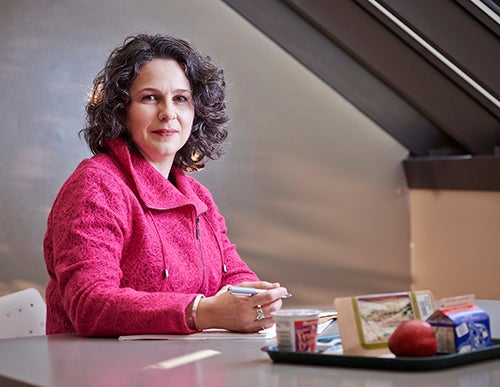
Nutrition and aging: Why aren’t older adults eating well?
Waterloo researcher leads study to find out why residents of long-term care homes aren’t getting proper nutrition

Waterloo researcher leads study to find out why residents of long-term care homes aren’t getting proper nutrition
By Staff Faculty of Applied Health SciencesQuick: Would you rather receive lukewarm food served on a hospital tray or order takeout from a menu created just for you?
The choice is obvious – and if Heather Keller had her way, more long term care homes in Canada would give residents access to innovative eating options like restaurant-style food service.
It just makes sense, explains the kinesiology professor and Schlegel Research Chair in Nutrition and Aging. Poor nutrition is rampant is Canada’s long term care homes—and inadequate food and liquid intake is often to blame.

Heather Keller, kinesiology professor at the University of Waterloo.
“We know that food intake in long-term care tends to be poor. But what we don’t know is why,” said Keller. “Is the food unappealing? Is the setting institutional? Are residents having physical trouble eating?”
These are the questions Keller hopes to answer in a pioneering new study spanning four provinces and 32 long-term care homes.
Keller recently received $979,000 from the Canadian Institutes of Health Research to fund the complex project, which will require teams of researchers to monitor the food intake patterns of 800 randomly selected long-term care residents.
The project’s goal is to link eating patterns with factors like meal quality, food access and mealtime experience to pinpoint exactly what deters older adults from eating.
“It’s not just one thing impacting food intake. If we can understand broadly what is happening, what are the big deterrents to food intake, we can successfully intervene on a large scale,” said Keller
The project marks the first time factors impacting food intake in long-term care settings have ever been investigated comprehensively. The findings are expected to help optimize health care practices and enhance the quality of life of Canada’s aging population.
“Poor food intake is both preventable and treatable,” said Keller. “But it’s about so much more than simply nutrition; it’s about quality of life.”

Read more
Here are the people and events behind some of this year’s most compelling Waterloo stories

Read more
Meet five exceptional Waterloo graduate students crossing the convocation stage as Class of 2025 valedictorians

Read more
Irfhana Zakir Hussain works to strengthen Waterloo’s capacity to withstand and recover from climate-related health crises
The University of Waterloo acknowledges that much of our work takes place on the traditional territory of the Neutral, Anishinaabeg, and Haudenosaunee peoples. Our main campus is situated on the Haldimand Tract, the land granted to the Six Nations that includes six miles on each side of the Grand River. Our active work toward reconciliation takes place across our campuses through research, learning, teaching, and community building, and is co-ordinated within the Office of Indigenous Relations.